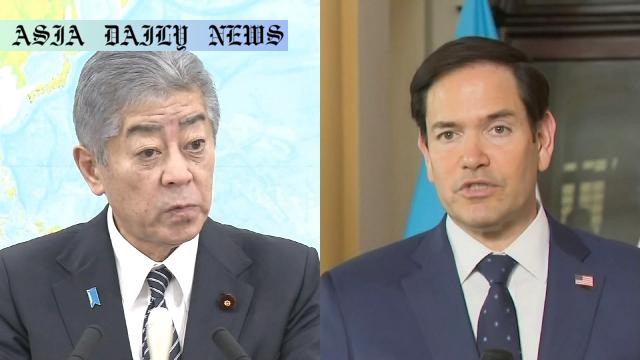Tariffs: Japan’s Foreign Minister Iwaya Takeshi urged the US to exclude Japan from tariffs, emphasizing reciprocal trade dynamics.
- Japan’s Foreign Minister Iwaya Takeshi requested tariff exclusions from Marco Rubio in Munich, Germany.
- Iwaya raised concerns over steel, aluminum, and automobile tariffs proposed by the US.
- The two nations pledged to enhance bilateral trade relations and consider a crucial two-plus-two meeting.

Introduction
Japan’s Foreign Minister Iwaya Takeshi recently met with US Secretary of State Marco Rubio during a brief exchange in Munich, Germany, aiming to address the potential repercussions of new US tariffs. The dialogue focused on future trade dynamics, reinforcing the importance of Japan-US relations in economic matters.
Japan’s Concerns Around Steel and Aluminum
During the discussion, Iwaya Takeshi specifically requested that Japan be excluded from a 25% tariff on foreign steel and aluminum imposed by the United States. Japan, being a critical trade partner, highlighted the potential adverse effects these tariffs could have, not only on Japan’s export economy but also on the broader global trade environment.
Pushback Against “Reciprocal Tariffs”
In addition to immediate concerns regarding steel and aluminum, Iwaya voiced significant apprehensions about the concept of “reciprocal tariffs.” This policy would allow the US to apply similar tariffs on imports from nations imposing higher duties on American goods. Japan emphasized the risks this measure could pose to their industries and its potential to instigate retaliatory economic actions globally.
Automobile Exports as a Major Point
Japanese automobile exports took center stage as a crucial issue. Iwaya communicated Japan’s strong opposition to any tariffs targeting their automotive sector. As automobiles constitute a significant portion of Japanese exports to the US, tariffs in this category would severely impact Japan’s economic stability and bilateral trade equity.
Commitment to Strengthen Relations
Both parties, despite their differing stances, reaffirmed the importance of maintaining a robust relationship for economic cohesion. They agreed to deepen bilateral trade relations and to ensure consistent dialogue to resolve these pressing trade issues amicably.
The Call for a “Two-Plus-Two” Meeting
Iwaya proposed hosting a “two-plus-two” meeting involving the foreign and defense chiefs of both nations. This initiative stems from commitments made during a Japan-US summit earlier in the month, aiming to strengthen not only economic ties but also security cooperation.
Concluding Remarks
The conversation between Iwaya and Rubio underscores the complexity and interconnected nature of Japan-US trade relations. As both nations strive for mutual benefit, the lingering question remains whether the US administration will heed Japan’s concerns, aligning policy to enhance collaboration rather than fostering economic barriers.



Commentary
Exploring Japan’s Concerns Over Tariffs
The ongoing discussions between Japan and the United States regarding tariffs epitomize the broader complexities of international trade. Japan’s proactive approach in addressing potential economic repercussions is commendable, illustrating their commitment to maintaining healthy trade relations while protecting their industries.
Impact on Global Trade Dynamics
The insistence on reciprocal tariffs by the US adds a layer of uncertainty to global trade. If implemented indiscriminately, these measures risk not only bilateral relations but also global supply chains. Japan’s strategic intervention in this matter showcases their understanding of the far-reaching consequences of protectionist policies.
Opportunities for Collaboration
Despite these challenges, the reaffirmation by both nations towards strengthening bilateral trade is a silver lining. The proposed “two-plus-two” meeting could serve as a crucial platform for fostering mutual understanding and cooperation, paving the way for both economic and security advancements.
The Road Ahead
While the outcome of these discussions remains uncertain, Japan’s resilience in voicing their concerns sets a positive example for other nations. The resolution of this issue could not only solidify Japan-US relations but also signal a commitment to fair trade practices on an international stage.